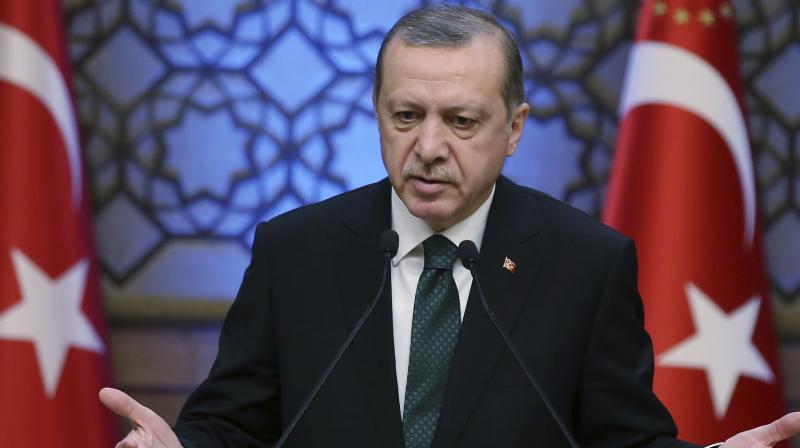Turkey heading to vote on expanding Erdogan powers

Ankara: Turkey is headed for a referendum this year on whether to dramatically expand the powers of President Recep Tayyip Erdogan after parliament backed the changes early Saturday.
The government insists the proposals to create an executive presidency will ensure simpler and more effective leadership, but critics fear they will edge Turkey toward one-man rule.
Parliament approved a new 18-article constitution, which includes the presidency changes, in a final vote with 339 approving, and 142 MPs voting against the bill.
Each article was put to a vote in the 550-seat parliament, where the ruling Justice and Development Party (AKP) enjoys a comfortable majority. At least 330 votes -- a three-fifths majority -- were needed to adopt the constitutional change.
Immediately after the bill was approved, Prime Minister Binali Yildirim said the "last word" would be had by the people in a referendum, expected to be held in April.
Deputy Prime Minister Mehmet Simsek said on Twitter the reforms would ensure stability, adding: "No more coalition governments that led to crises in 1970s and 1990s."
The bill would create an executive presidency for the first time in modern Turkey and give the president the power to appoint and fire ministers.
In addition, the post of prime minister will be abolished for the first time in the country's history and replaced by a vice president, or perhaps several.
Worst fighting in years
The debates have been fractious and the assembly has witnessed some of the worst fighting in years including clashes on Thursday after an independent lawmaker, Aylin Nazliaka, handcuffed herself to the microphone on the platform.
The bill would allow parliamentary elections and presidential ballots to be held at the same time, with the draft giving November 3, 2019 as the poll date.
Yildirim said the changes would allow for a "sole power that would be strong", meaning a more decisive approach to solving problems.
"There would be no weakness in fighting terror (or)... on economic issues," Yildirim said in an interview with TRT Haber broadcaster.
The proposed changes would also widen the scope of conditions in which the president can declare an emergency and would allow for a period of six months initially, up from the previous 12 weeks.
Turkey has been under a state of emergency for almost six months following the July 15 failed coup that tried to overthrow Erdogan.
It was extended earlier this month meaning that campaigning for the referendum will take place under the emergency, raising concerns among human rights groups.
Emma Sinclair-Webb, Turkey director of Human Rights Watch, said she feared the public would not be sufficiently informed about the implications of the bill.
"There is no possibility under a state of emergency for an effective public debate in the media about the changes that are being brought in," she said.
Not reform but suicide
The debate takes place during a tense period after a bloody 2016 which saw multiple terror attacks by Kurdish militants and Islamic State jihadists.
On Saturday, an assailant opened fire on a police car in Istanbul, just hours after two rocket attacks against the police and Turkey's ruling party offices, local media reported.
No one was killed or injured, and no group claimed responsibility.
The political instability has contributed to the lira's continuous decline in value against the US dollar, and worries over the already fragile economy.
Opponents have accused Erdogan of marching towards authoritarian rule, comparing the executive presidency to sultans of the Ottoman Empire.
Sinclair-Webb told AFP the changes could not be compared with other countries like France or the United States because of their "strong checks and balances on the power", despite the government's insistence.
"According to the Turkish model that is outlined in this amendment, you don't have any such check on presidential power."
President of the Union of Turkish Bar Associations (UTBA) Metin Feyzioglu criticised the changes, saying they harked back to the country's Ottoman history.
"This new system is not unknown to us, because we have been ruled for 600 years in this way. It has a name which is sultanate," Feyzioglu said.
He added: "It is not a reform but suicide and the people will not commit suicide."

